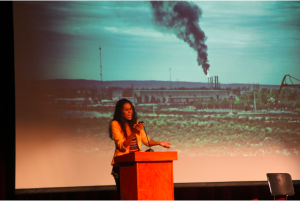
Event against environmental racism held at Dalhousie draws crowd of nearly 200

Environmental disasters in nearby communities were showcased at the In Whose Backyard event. (Photo by Natasha MacDonald-Dupuis)
Jonathan Beadle’s backyard is host to one of Canada’s worst – and least talked about – ongoing environmental disasters.
The Abercrombie Point Pulp and Paper Mill in Pictou, Nova Scotia dumps 70,000,000 litres of effluent every day into Boat Harbour, an estuary that borders Beadle’s reserve.
“In that effluent there are toxins that would kill anybody, I don’t care how healthy you are,” said Beadle.
The member of the Pictou Landing First Nation was one of the speakers at the “In Whose Backyard” event organised by NSPRIG and the Environmental Noxiousness Racial Inequities and Community Health project (ENRICH) last week.
The event bridged environmental and social justice issues, bringing together students and people from a wide range of communities around the province.
Beadle, who lost a close cousin to cancer, believes the toxic sewage from the mill has been causing health problems in his community for generations.
“They said it was a rare kind [of cancer], and they often say that of people who have fallen ill in my community,” he said.
“My cousin had tumours protruding from his jaw … and another one protruding from his eyeball,” added Beadle.
Beadle has been advocating for environmental justice in his community for 15 years.
He says government officials in Nova Scotia have ignored the issue for decades.
“Boat Harbour is well hidden. Its not a place where you can drive by and get a sense of what exactly is going on,” said Beadle.
Annie Clair, another Mi’kmaw activist, also lives on an isolated reserve.
She shared a similar story about how her community of Elsipogtog, NB had been affected by contaminated waters.
The Mi’kmaw protector said her people have lost their method of gathering food because they cannot fish in the waters.
“There are barely any elders in my community to pass along the culture and tradition because they are dying from diseases … or the pollution in the water,” said Clair.
After a pause to compose herself, she reminded the audience that protecting the environment is everyone’s responsibility.
“You drink the same water as we do. If our children and our elders get affected, your children, your elders get affected,” she said.
Participants later broke into discussion groups to exchange ideas on how to cope with the issues at hand.
Bryan Crouse, the resource and administration coordinator at NSPIRG, said he hopes the event will inspire students to get involved.
“One of the reasons for holding this event was to start the conversation on campus and see what students can do about these issues,” he said.
Crouse added that a follow-up meeting is planned for Oct 21 to discuss direct actions.
Shortly after the event, Jonathan Beadle told The Gazette he wished he’d shown pictures to the crowd of the environmental catastrophe that is Boat Harbour.
“When Elizabeth May came to visit Boat Harbour, she said, ‘If you had brought me in with a helicopter and a blindfold, I would not have known I was in Canada. I would have thought myself to be in China.






